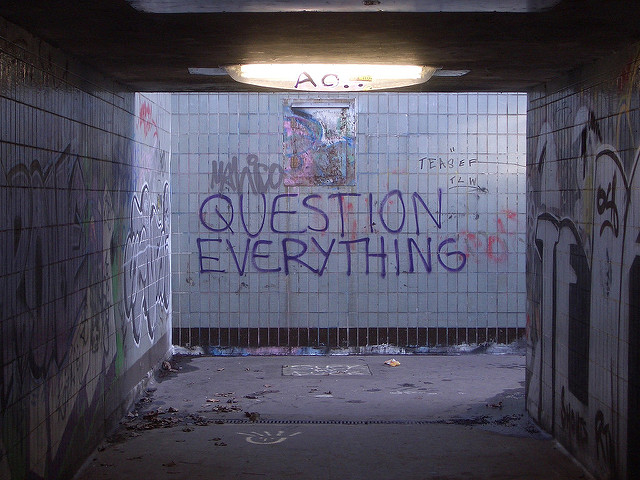
Sustaining Curiosity
Many of the people who talk to me about spiritual life expect it to be a place where they can find certainty. They feel frustrated with ambiguity and searching. People want spiritual life to be a place they can go to find answers.
People apparently do not experience spiritual life as a journey, but as a destination. They want to arrive at spiritual life.
We tend to value spiritual life more when we believe we have found answers. When answers are more difficult for us to see we often begin to doubt the value of spiritual life.
One of the challenges of spiritual life is our expectation it will provide solutions.
We would be happy if spiritual life would just be straight with us and tell us what to do. Why is there no checklist, no rules, no users’ manual for spiritual life?
Why does spiritual life have to be so frustratingly spiritual?
We tend to want to memorize and organize whatever we believe. It seems to be important for us to have things nailed down, within our grasp. We do not want spiritual life to escape and get away from us.
If only spiritual life were more linear, more certain, it would be much more attractive to people.
My experience of spiritual life does not support the idea it is a path toward certainty. I do not remember the last time spiritual life directed me toward a certain answer. The evidence draws me to conclude spiritual life is focused on sustaining curiosity.
When I believe in the strength of the answers I think I have found, I usually stop asking questions. Spiritual life is much more about prompting me to ask questions than finding answers.
Why is Curiosity Good For Us?
Curiosity makes some people nervous or anxious. They get concerned about sticking their noses into other people’s lives. Some of us believe it is better to mind our own business and not be busybodies.
Curiosity can, though, help us continue to be open to the life around us. As we pay attention to each moment we realize each one is full of potential and wonder.
Sustaining curiosity helps us be open and alive to ourselves and to other people.
Many people get less curious as they spend more time and energy on their lives. Life can feel like a series of steps toward our destinations or obstacles to overcome. We work to meet our responsibilities, focused on what needs to be done.
It can be easy for us to lose interest in the life around us as we struggle through our own challenges.
Sustaining curiosity seems difficult for us to accomplish in the long run. There are so many things for us to think about, so many things we need to remember. Just keeping everything moving in the same direction captures our attention. We do not have time for sustaining curiosity.
As we become preoccupied with the details of living our curiosity gets weak and small. Our attention is spread so thin we cannot really be curious anymore.
It is important to recognize what kind of curiosity is good for us. I am not particularly curious about the public lives of celebrities or athletes. How people experience spiritual life interests me much more than how much their cars cost.
The curiosity which helps us continue to grow is deeper, more personal. It draws us to ask why things are the way they are and what they mean to us.
Curiosity encourages us to look beyond what we think we see.
How Are We Sustaining Curiosity?
Our curiosity can lose its strength when we are not convinced we need it anymore. We are not sure we need curiosity to live our lives well and it becomes a luxury.
Many people think curiosity can be a good quality for children, but we outgrow it. They assume we lose our curiosity as we grow up, like our baby teeth.
Other people understand our curiosity can last our entire lives. As we grow older our curiosity can become deeper and stronger, and serve us even better.
Like our physical muscles, we can exercise our curiosity muscles and develop a strong curiosity. It is never too late to build up our capacity for curiosity.
One of the best ways of sustaining curiosity throughout our lives is to ask questions.
Some people only ask questions when they want to find the answers. They ask for information or for a specific solution.
People who want to develop and sustain curiosity ask as many questions as we can.
How Does Curiosity Sustain Us?
Learning to ask good questions, and listening to the responses, is the first step in sustaining curiosity.
As we become people who are able to ask good questions we realize our curiosity is sustaining us.
We start to recognize our attention is less distracted in each specific moment. As we pay attention we notice people and things around us. Our sense of wonder is triggered by the most interesting things. The openness and curiosity we have developed lead us in new directions.
Our questions help us explore territories we have never noticed before. We discover the most fascinating truths, and we continue growing in curiosity.
Sustaining curiosity carries us into new areas and raises more questions than it answers. We find we are still meeting our responsibilities even when curiosity expands our horizons.
Curiosity can be one of our most neglected spiritual practices. We practice disciplines which help us become more open to spiritual life. As spiritual life draws us in and enfolds us, our curiosity takes us deeper.
Spiritual life fills the worlds around us and within us. We grow in appreciation for the power and possibilities of spiritual life. Our sustaining curiosity inspires us to explore and recognize how spiritual life shapes us.
Spiritual life is both intimate and immense. We practice spiritual curiosity and are drawn to discover spiritual life we may have missed.
We open our eyes and are filled with sustaining curiosity.
How are you sustaining curiosity this week?
What questions have you asked today?
[Image by dullhunk]
Greg Richardson is a spiritual life mentor and leadership coach in Southern California. He is a recovering attorney and university professor, and a lay Oblate with New Camaldoli Hermitage near Big Sur, California. Greg’s website is StrategicMonk.com, and his email address is [email protected].












